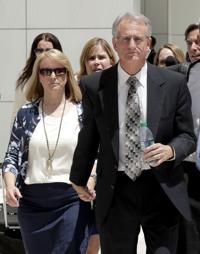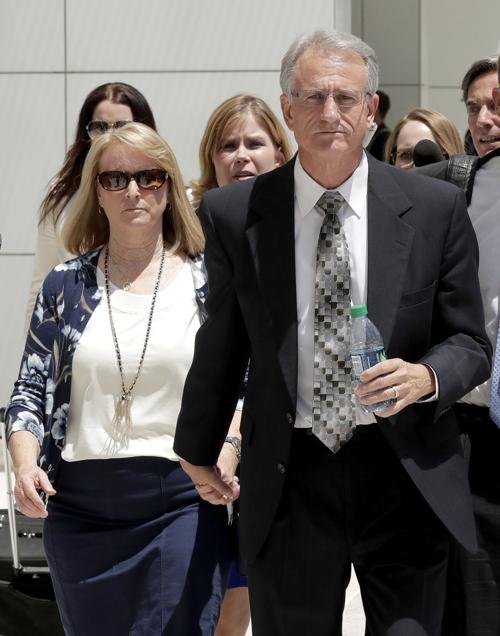PHOENIX — Federal agents threatened to indict the wife of former utility regulator Gary Pierce if he did not plead guilty to bribery charges, Sherry Pierce’s attorney said Tuesday.
FBI agents showed up at the couple’s house May 16, just days before a federal grand jury indicted both, said the attorney, Ashley Adams.
“My client was in her robe,” Adams told U.S. District Court Judge James Tuchi on Tuesday. She said the agents, with a draft of the proposed indictment in their hands, told Gary Pierce that if he did not plead guilty, “We’re going to indict the mother of your children and the grandmother of your grandchildren.”
Adams did not say what the couple told the agents. But a week later, Gary and Sherry Pierce were indicted on charges of bribery and fraud, along with the owner of a utility company, George H. Johnson, and a lobbyist, Jim Norton.
Assistant U.S. Attorney Frederick Battista did not address the allegation during the court hearing, and he refused to comment on it afterward.
According to the indictment, Johnson funneled $31,500 through Norton to Sherry Pierce for what prosecutors contend was minimal work. The contention is that the funds were a bribe for Gary Pierce to vote for two issues of interest to Johnson before the Arizona Corporation Commission: allowing owners of small firms like Johnson Utilities to pass some of their income-tax obligations along to customers and increasing the company’s rate base so it could boost its charges.
All have pleaded innocent.
Adams and the attorneys for the other three defendants went to court Tuesday to get access to various FBI interviews, case agent notes and other documents.
Prosecutors did not want to provide some documents unless there was a court order prohibiting the defense team from sharing with others, including the media. Battista argued outside disclosure could harm another — and larger — investigation that is still pending.
Records show the prosecution has an FBI report of agents’ interaction with the Pierces on that May morning, but it is one of the documents prosecutors don’t want disclosed to the public.
Adams asked Tuchi how an interaction with the couple could be considered confidential. And attorney Patricia Gitre, who represents Gary Pierce, questioned how an FBI report about an early morning pre-indictment interaction with the couple could be part of some other investigation.
Battista defended the confidentiality, telling the judge, “Once they have the information, they will understand how it’s possible that pertains to another investigation.”
Prosecutors are arguing that if what’s in that document — and others — gets out, it will become evident who else the FBI is investigating. They already have said there is a “much larger and more intensive investigation.” Battista said premature disclosure could undermine that inquiry and result in witnesses refusing to cooperate because they fear their names will end up in newspapers.
Attorney Ivan Mathew, representing lobbyist Norton, was not impressed. “That is gobbledygook,” he told the judge.
Woody Thompson, representing Johnson, said the burden is on prosecutors to show the judge why documents in the government’s control should be shielded from outside eyes. The claims of harm by Battista are “all speculation and conjecture at this point,” Thompson said.
Tuchi said federal law clearly requires the government to turn over any information about the case to defense attorneys. But the judge also said he understands the harm prosecutors are claiming if some of that information gets out.
To narrow what’s restricted, the judge ordered prosecutors to surrender everything they have on this case and then “find the carve-outs” of which documents and interviews they believe cannot be shared beyond the defendants and their lawyers.
That order ensures the defense team can see what the government has and what it wants protected. At that point, Tuchi said, the lawyers can file legal motions arguing whether there should be restrictions on use of the materials.
Battista noted that, even without disclosure of the documents and interviews, there have been media reports and speculation on what else is being investigated.
Both the Corporation Commission and Pinnacle West Capital Corp., parent of Arizona Public Service utility, have disclosed contact with the FBI.
And Gary Pierce told Capitol Media Services after he was initially interviewed by the FBI that agents were questioning him about the 2014 election.
The probe appears to be an outgrowth of an investigation originally started at the state Attorney General’s Office. It included allegations that Pierce, while a regulator, met secretly with Don Brandt, the chief executive of APS, and Don Robinson, his predecessor, while the utility was in the middle of a rate case before the commission.
That state investigation also was looking into $500,000 spent by the Free Enterprise Club in 2014 on behalf of Gary Pierce’s son, Justin Pierce, who was running for secretary of state. Wil Cardon, another candidate in that race, charged that the elder Pierce used his position on the commission to get financial support for Justin’s campaign from companies regulated by the panel.





